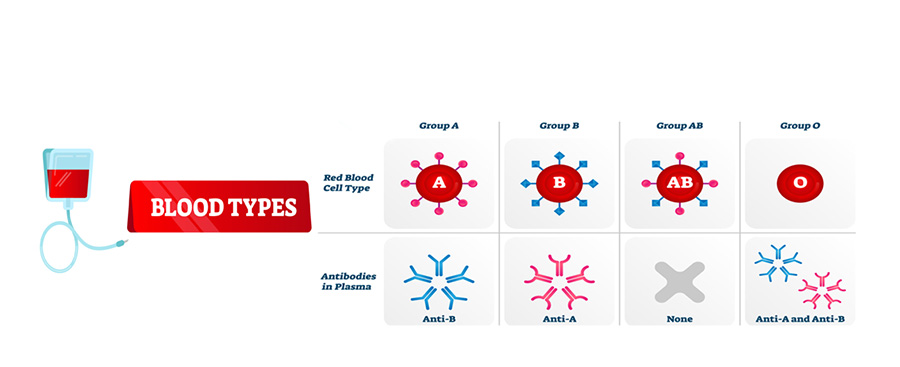
If you need to have a blood transfusion it is essential that you are given blood that is similar or compatible to your own to prevent reactions to the transfusion and potentially severe illness. The laboratory will identify your blood group and whether you have any additional red cell antibodies. With this information they will select the most compatible blood to your own, known as a crossmatch.
What is being tested?
A crossmatch is a group of tests undertaken before a person requires a blood transfusion. The transfusion laboratory completes a blood group antibody screen to establish the person's blood group and identify any possible red cell antibodies that may be present in their blood. Once completed, the transfusion laboratory then matches these results to compatible donor blood that can be safely transfused to the person.
Red blood cells have chemical structures (most commonly proteins or carbohydrates) on the outside surface of a red blood cell. These chemical structures usually have a defined function such as determining the shape of the cell or the transport of chemicals into, or out of, the red blood cell. In addition, they determine a person's blood group.
There are over 200 different blood groups known. The most important blood groups are the ABO and the RhD blood groups. However other blood groups can also become important. There are inherited blood group differences between people. When a person is exposed to blood groups that are different to their own the immune system may respond by producing a blood group antibody. This is very similar to the way we produce antibodies against germs (bacteria and viruses). The transfusion laboratory performs an antibody screen to detect and identify any blood group antibodies as these can cause transfusion reactions or haemolytic disease of the newborn (HDN).
If a transfusion is required it is important that the transfusion laboratory provides compatible blood. The blood selected for transfusion will usually lack the blood group that the person has an antibody against. A crossmatch is a final test that is performed to reduce the likelihood of a transfusion reaction. This test may be performed using laboratory tests or may be undertaken by a computer program (computer crossmatch) using results obtained from blood groups and antibody screens.
How is it used?
To enable the transfusion laboratory to select and issue the most appropriate and compatible blood for a transfusion.
When is it requested?
If your doctor indicates that transfusion with blood or blood components may be required as part of your medical treatment.
What does the result mean?
The result allows laboratory staff to select appropriate blood for transfusion.
Common questions
Transfusion of red cells is to replace the oxygen carrying capacity of the body. If you start your operation with enough red cells (a high haemoglobin (Hb)) any blood loss due to a surgical procedure may result in a drop of Hb that does not require transfusion. If however you begin the operation with a low oxygen carrying capacity, (a low Hb /anaemia) then your chances of requiring a blood transfusion increase. Consult with your doctor as to how to improve your Hb in your pre-operative assessment.
Transfusion is associated with a number of risks. You should make the decision as to whether a transfusion is required in consultation with your doctor and with an understanding of these risks. More information regarding risks can be found at the Australian Red Cross Blood Service: Transfusion medicine.
Directed donations - where blood is donated for a specific person - are strongly discouraged, and in some circumstances not permitted. The safest blood (lowest risk of transfusion transmitted viruses such as HIV/AIDS and hepatitis) is that donated freely by individuals with no pressure placed on them or no incentives provided. When people feel under pressure to donate (such as for a family member) there is a possibility they may conceal important information that could be harmful to either themselves, or to the recipient of the blood. A major risk in transfusion is human error (doctors, nurses or laboratory staff inadvertently making a mistake). These risks are still present with directed donations.
More information
What is Pathology Tests Explained?
Pathology Tests Explained (PTEx) is a not-for profit group managed by a consortium of Australasian medical and scientific organisations.
With up-to-date, evidence-based information about pathology tests it is a leading trusted source for consumers.
Information is prepared and reviewed by practising pathologists and scientists and is entirely free of any commercial influence.